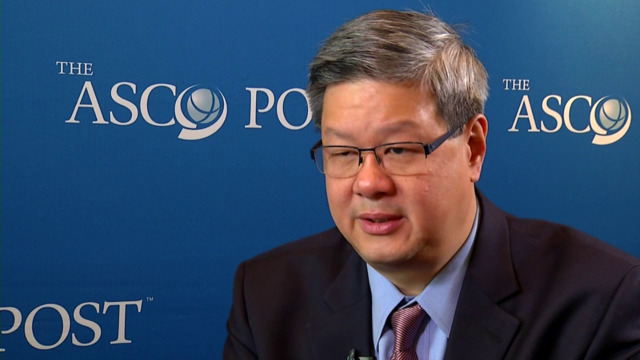Hans Gerdes, MD, on Endoscopic Therapies for Early-Stage Esophageal Cancers
2015 NCCN Annual Conference
Hans Gerdes, MD, of Memorial Sloan Kettering Cancer Center, discusses a new approach to the management of early-stage esophageal cancers with endoscopic resections.
Robert W. Carlson, MD, and Lee N. Newcomer, MD, MHA
Robert W. Carlson, MD, Chief Executive Officer of the National Comprehensive Cancer Network, and Lee N. Newcomer, MD, MHA, of UnitedHealthCare, discuss the value of NCCN Guidelines in determining coverage decisions, the future of affordable care, bundled payments, and the clear value approach.
Mary Lou Smith, JD, MBA
Mary Lou Smith, JD, MBA, of the Research Advocacy Network, discusses, from the perspective of a patient advocate, the value of the NCCN guidelines and the impact they have made on cancer care.
Samuel M. Silver, MD, PhD, and Margaret A. Tempero, MD
Samuel M. Silver, MD, PhD, of the University of Michigan Comprehensive Cancer Center, and Margaret A. Tempero, MD, of the UCSF Helen Diller Family Comprehensive Cancer Center, discuss drugs developed for hematologic malignancies that have activity in pancreatic cancer, vaccines, neoadjuvant treatment, and the need to focus on activated RAS.
Wui-Jin Koh, MD
Wui-Jin Koh, MD, of the Fred Hutchinson Cancer Research Center and the Seattle Cancer Care Alliance, discusses the program to adapt NCCN guidelines to regions of the world with different resource availability. The first guideline to be adapted in this way is for cervical cancer, which is prevalent in the developing world.
Kenneth C. Anderson, MD
Kenneth C. Anderson, MD, of Dana-Farber/Brigham and Women’s Cancer Center, discusses the incredible progress made in treating multiple myeloma, with nine therapeutic options approved in the past decade, two drugs approved this year, and a number of new options on the horizon.





